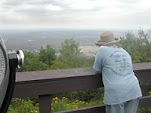The other night I was at my choir director's house with some other friends, and one guy (we'll call him Antoshka) had spent Thanksgiving with a bunch of Coptics. The choir director had an encyclopedia of the ancient world, so we were reading about Copts, and Antoshka said how the Early Church was really focused in Egypt and Armenia. I said what about Georgia, and he said that wasn't Christian until much later. So of course we had to look up Georgia in the Encyclopedia of the Ancient World. The first thing it said is that ancient Georgia was divided into two kingdoms, one in the east and one in the west (although it gave conflicting accounts of which was which): one called Lazica and one called... IBERIA??
This struck me as fascinating because of course the Iberian peninsula is the area including Spain and Portugal, and it has been known as Iberia since ancient times. So why would Georgia also be called Iberia? Was there possibly a connection between the Georgians and the Basques? I once wrote a paper in college on this subject, but my main reference was a paper from the 1950's written in French, so I'm not sure this is seriously considered a plausible theory anymore. However, there were some interesting parallels in basic vocabulary words like sheep, wind, rain, mountain... Important words indeed for mountain-dwelling shepherding peoples! Did the ancient Greeks and Romans know something we don't know? Are the Basques and the Georgians indeed related, since they are both Iberians?
Maybe it is just a coincidence. Although many people in the state of Georgia in the US are of the Caucasian race, nobody seriously wonders if US Georgians are Caucasians. After all, they are not mountain-dwelling people. But what about Appalachians? Nobody has ever mentioned that possibility before. Since so many people seem to think the term "Appalachian" has a negative connotation, I am proposing that from now on we refer to them as "Iberians." It has more cachet, sounding slightly Continental, and if all it means is "mountain people," then they are as Iberian as any Basque or Georgian!
Famous Hat
Thursday, December 4, 2008
Subscribe to:
Post Comments (Atom)


No comments:
Post a Comment